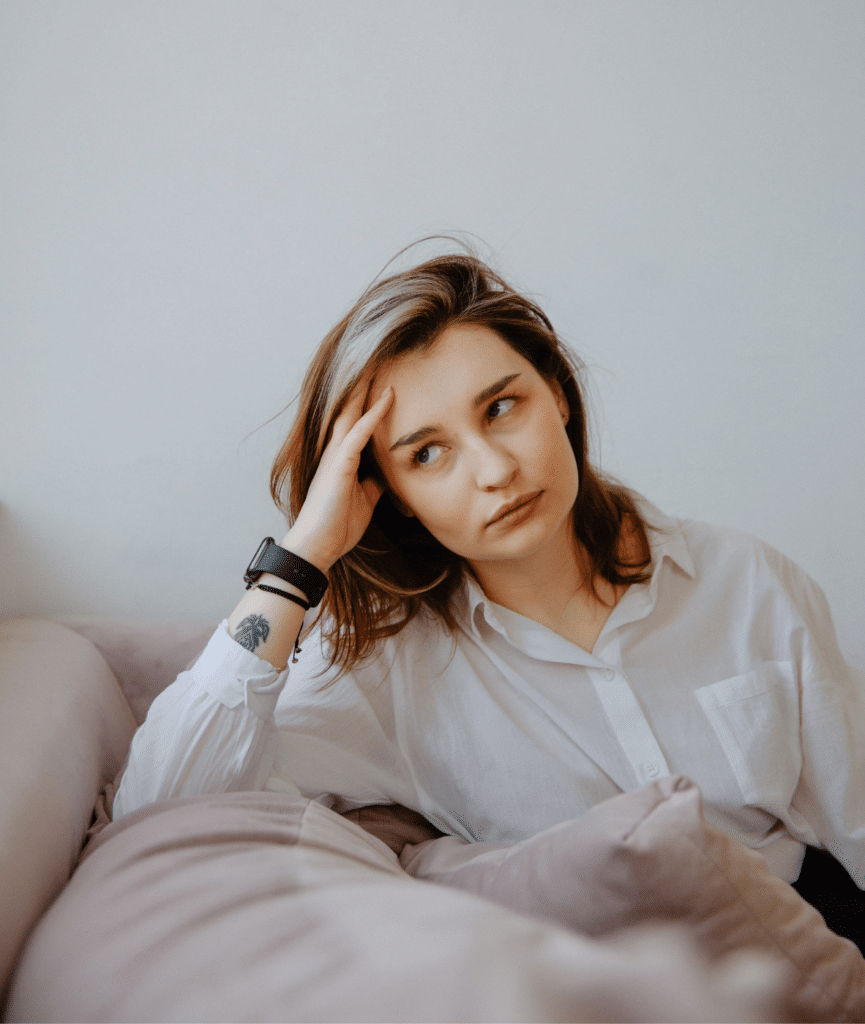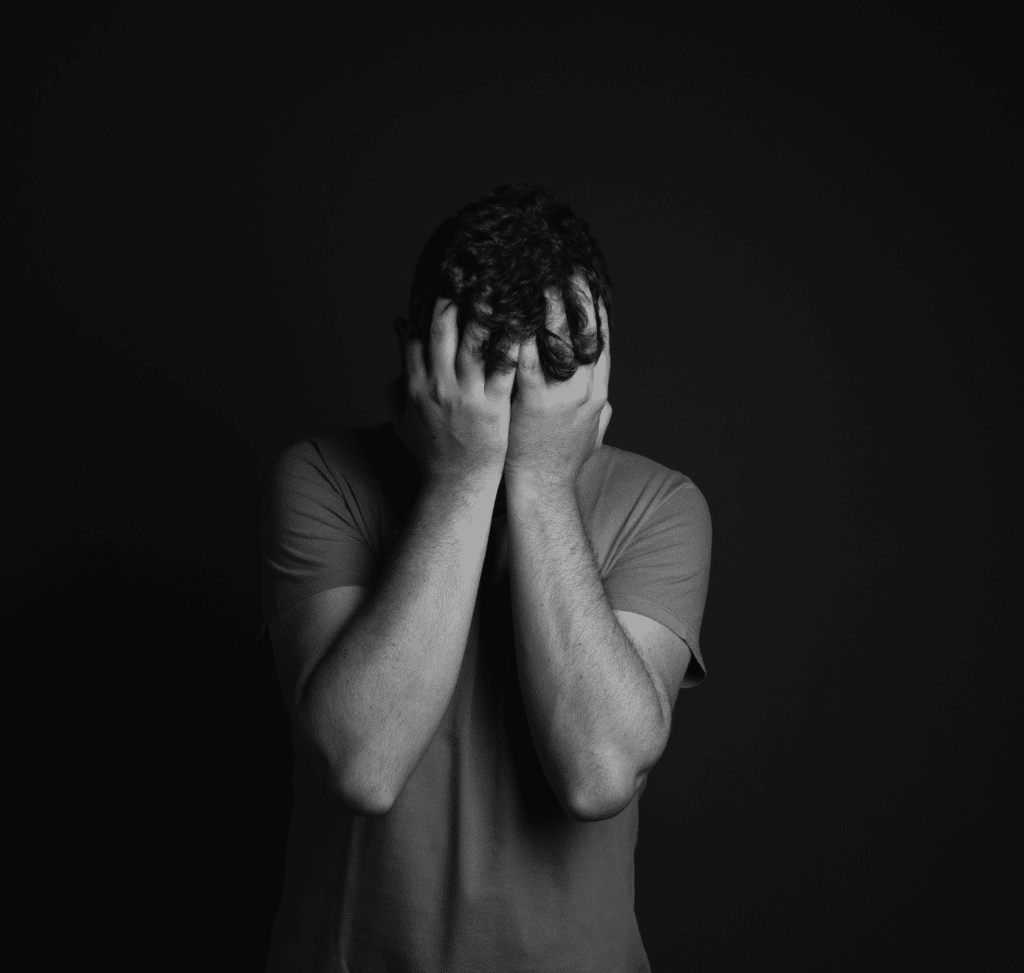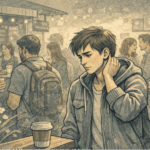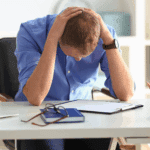Depression vs. Anxiety – Understanding the Differences

Do you feel constantly overwhelmed with worries? Or perhaps it’s that sadness that won’t seem to go away? If so, you’re not alone. Millions of people every year grapple with anxiety or depression, and nearly half of people diagnosed with depression also have anxiety.1 But what exactly are the differences between the two?
Although anxiety and depression can seem similar in some ways they are completely unique conditions, each with their own specific symptoms and treatments. In this article, we’ll look at:
The main differences and similarities between anxiety and depression
- Anxiety and depression symptoms
- Whether you can experience both anxiety and depression at the same time
- Ways of treating anxiety and depression.
By the end, you should have a clearer idea of how the two differ and how you can begin healing from them. Let’s dive straight in.

Key Takeaways
- Depression and anxiety are distinct conditions: Depression often involves persistent sadness or hopelessness and loss of interest, while anxiety centers on excessive worry, fear, or nervousness.
- Both disorders can affect mood, sleep, appetite, energy, concentration, and daily functioning — and physical symptoms such as fatigue, restlessness, or tension may appear.
- It is common for depression and anxiety to co‑occur; Many individuals experience symptoms of both at the same time, which can complicate diagnosis and treatment.
- Recognizing which signs correspond to depression, anxiety, or both is critical to developing an effective care plan.
Table of Contents
What Is the Main Difference Between Anxiety and Depression?
What Is Depression? Everyone has the occasional bad day when they feel a bit down, but depression is more than that. It’s a sadness that won’t shift, a long-lasting low mood, and complete disinterest in doing things. You might feel hopeless, lacking any motivation or energy to do anything, driven to despair, or emotionally numb.2,3 It affects your ability to do the normal everyday things you usually do, like showering, making meals, and being able to work.4,5
What Is Anxiety? Anxiety is a normal part of life when it’s working as it should – it’s what protects us from harm and keeps us safe, as it notifies us of potential danger. However, when anxiety becomes uncontrollable and overwhelming, it can be a big problem.4
If you have an anxiety disorder, some of these might ring true with you: feeling on edge, nervous, fearful, panicky, overwhelmed, and worrying that feels never-ending and difficult to control.2,3,6 It isn’t the occasional worry about one-off problems such as money or a specific work deadline. The fear and anxiety don’t go away – they invade many different situations and get worse with time.7 Anxiety can affect your job, your relationships, and your daily activities. You might stop going out and start avoiding the things that make you feel more anxious.8
Key Similarities Between Anxiety and Depression
Whether you live with anxiety or depression, both can severely affect your ability to do your everyday tasks and live your life. Whether it’s through lack of energy, motivation, or avoiding things that trigger fear, you might start to withdraw from things you used to enjoy doing and slowly cut yourself off from the rest of the world.
How to Identify Depression and Anxiety
So, now you can tell the difference between anxiety and depression, how do you identify if you have one or the other, or perhaps both? Check out the lists below for some of the most common anxiety and depression symptoms and signs.
Signs of Depression
Often feeling sad- No interest in doing hobbies or things you used to enjoy
- Feeling irritable or restless and fidgety
- Sleep problems (falling asleep, staying asleep, waking up, sleeping too much)
- Appetite changes (eating more or less than usual or having no appetite)
- Stomach problems
- Difficulty concentrating, remembering things, or making decisions
- Feeling tired and lacking energy, even after a good sleep
- Aches and pains (headaches, muscle aches, unexplained pains)
- Feeling worthless, guilty, or hopeless
- Thoughts of hurting yourself or not wanting to live anymore
Symptoms of Anxiety
Feeling restless, irritable, or fidgety- Unable to control worries
- Feeling on edge, tense, or nervous
- Difficulty concentrating
- Feeling fatigued, tired, or tearful
- Aches and pains such as headaches, stomach aches, muscle aches, chest pains
- Problems sleeping (unable to fall asleep, trouble staying asleep)
- Sweating, nausea, diarrhea, faster heartbeat
- Panic attacks
- Feeling lightheaded, breathless, or dizzy
- Appetite changes
- Difficulty relaxing or enjoying downtime
Can You Have Anxiety and Depression?
In fact, surveys have been carried out that show a large proportion of people with depression have at least one type of anxiety disorder at the same time, whether this is generalized anxiety disorder (GAD), social anxiety disorder, panic disorder, or another type.12
Can Anxiety Lead to Depression? We know that you can have both depression and anxiety at the same time, but can anxiety lead to depression? That might be the case. Evidence shows that some people might feel depressed or experience their depression getting worse because of their anxiety. In fact, roughly 50% of people say this to be true.2,12-15
So we know it can happen, but why does it happen? Here’s where it can get complicated. If you have anxiety, you might naturally be avoiding certain situations that cause you to feel stressed and scared. Because of this, you can become progressively more isolated and feel more lonely, which can then lead to depression. When you try to do your normal routine and anxiety gets in the way, you might start to lose confidence in yourself and feel hopeless, contributing to feelings of depression.16
The next question is: can depression cause anxiety? The answer is: The research suggests the two are closely linked, although it can’t confirm a causal link. When considering the link between these two, think back to a time when you’ve felt depressed and become withdrawn because you don’t have any motivation or energy. When the time comes to return to your normal daily routine, things might feel confusing and stressful, resulting in worrying and anxiety.2
This is just one instance of how anxiety and depression can interlink. You may be able to think of many other occasions where it’s felt like your anxiety worsens your depression, or vice versa.
How to Treat Depression and Anxiety
Anxiety and Depression Therapy
Therapy for anxiety and depression is highly effective and can often bring long-lasting relief. One therapy that is particularly helpful in reducing the symptoms of depression and anxiety is cognitive behavioural therapy (CBT).
Cognitive Behavioral Therapy (CBT)
Research consistently shows that CBT can help reduce depression and anxiety symptoms, and it is currently considered the best standard available in the area of psychotherapy.19,20
CBT works by helping you to become aware of the thoughts you have and what you might be doing that are contributing to your symptoms and then encourages you to work to change though. There are some differences between the approach used for anxiety and depression. When treating anxiety, the goal is to help you stop avoiding the things that make you feel anxious and to tackle your fears. When used for depression, it can help you to reconnect with your positive emotions.2
Anxiety and Depression Medication
Antidepressants are thought to work by boosting chemicals in the brain linked to our mood and emotions, called neurotransmitters.22 They can help to improve your mood and let you feel more capable of doing things that seem challenging with anxiety and depression. They can also give you a clearer headspace and allow you to see through the mental fog you may be experiencing.
Antidepressants typically take 2-6 weeks until you start to feel the full benefit, and are generally considered safe to use due to thorough research and testing.21 However, all medications come with side effects which should be considered when discussing medication choices with your doctor. What’s more, some medications are approved for adults but not for teens and children, so this is worth bearing in mind.
The two most commonly recommended for depression and anxiety are listed below.
Selective serotonin reuptake inhibitors (SSRIs) allow you to get extra benefit from a chemical in the brain called serotonin, which helps regulate your mood. SSRIs are usually the first type of antidepressant tried with patients because they often have fewer side effects than other medications.21- Serotonin-norepinephrine reuptake inhibitors (SNRIs) work in a way similar to SSRIs, but they also have an effect on the norepinephrine in your brain, which is a chemical and a stress hormone. It has a big impact on your fight-and-flight response and can also affect your moods. SNRIs aim to boost the positive effects of serotonin and norepinephrine in the brain. They can also be a good treatment choice if you experience anxiety as well as depression, due to their effect on the fight-and-flight response.22
Self-Help Strategies
Depression and anxiety can feel overwhelming, but making some small changes to your everyday self-care can actually make a difference. Here are some ideas for you to try:
Mindfulness
: Bringing mindfulness into your daily routine can really help you to find moments to be able to breathe and become aware of what’s happening in the moment.- Nutrition: Research suggests that a diet rich in fruits, veg, fish, whole grains, antioxidants, low-fat dairy, and olive oil can reduce your risk of depression and anxiety, so perhaps have a think if there are some simple swaps you could do to bring some of this good-mood food into your daily diet.23,24
- Journaling: Getting your thoughts and feelings down onto paper and out of your head can feel good and allow you to reflect.
- Sleep: Getting enough sleep is important for you to have enough energy to go about your day, but we all know that it can go out the window when we feel anxious, depressed, or stressed. Trying to stick to a regular wake-up and sleep time can really help if your mind is affecting your sleep.
- Exercise: Regular physical activity can have a positive impact in reducing symptoms of anxiety and depression. It also causes endorphins to be released in your body, which have mood-boosting effects and can also be a really healthy distraction from worries and negative thoughts. Whether it’s dancing, yoga, or going for a walk, moving your body can help with shifting your mindset.25
Get Treatment for Anxiety and Depression Now
If you are struggling to manage your depression or anxiety, we are here to help you. At Mission Connection, we have a team of licensed, experienced mental health clinicians ready to help you on your journey to healing.
You can expect an in-depth assessment by a qualified professional, and a unique and individualized plan to help you heal. We will also be here to give you continued support as you manage your depression or anxiety.
We know that the cost of treatment for mental health care can be a worry for some people. That is why we provide a range of payment options, including insurance plans, flexible private pay, and financing plans to spread the costs over time, as well as sliding scale fees based on financial need.
Are you ready to start feeling better? Contact us today to discover how we can support you.

References
- Facts & Statistics | Anxiety and Depression Association of America, ADAA. (n.d.). https://adaa.org/understanding-anxiety/facts-statistics
- Mph, Z. S. (2022, March 29). Anxiety vs. depression: Similarities and differences. https://www.medicalnewstoday.com/articles/anxiety-vs-depression
- Depression vs. Anxiety: Which One Do I Have? (n.d.). WebMD. https://www.webmd.com/depression/depression-or-anxiety
- Understand the facts | Anxiety and Depression Association of America, ADAA. (n.d.). https://adaa.org/understanding-anxiety
- Depression. (n.d.). National Institute of Mental Health (NIMH). https://www.nimh.nih.gov/health/topics/depression
- Depression and anxiety. (2023, March 14). Centers for Disease Control and Prevention. https://www.cdc.gov/tobacco/campaign/tips/diseases/depression-anxiety.html
- Anxiety disorders. (n.d.). National Institute of Mental Health (NIMH). https://www.nimh.nih.gov/health/topics/anxiety-disorders?rf=32471
- What is Anxiety Disorder? (n.d.). SAMHSA. https://www.samhsa.gov/mental-health/what-is-mental-health/conditions/anxiety
- What is Depression? | Anxiety and Depression Association of America, ADAA. (n.d.). https://adaa.org/understanding-anxiety/depression
- What is Depression? (n.d.). SAMHSA. https://www.samhsa.gov/mental-health/what-is-mental-health/conditions/depression
- Website, N. (2025a, January 15). Anxiety, fear and panic. nhs.uk. https://www.nhs.uk/mental-health/feelings-symptoms-behaviours/feelings-and-symptoms/anxiety-fear-panic/
- Kalin, N. H. (2020). The critical relationship between anxiety and depression. American Journal of Psychiatry, 177(5), 365–367. https://doi.org/10.1176/appi.ajp.2020.20030305
- World Health Organization: WHO. (2023, September 27). Anxiety disorders. https://www.who.int/news-room/fact-sheets/detail/anxiety-disorders#:~:text=Anxiety%20disorders%20increase%20the%20risk,settings%2C%20primarily%20affecting%20children).
- Wilmer, M. T., Anderson, K., & Reynolds, M. (2021). Correlates of Quality of life in Anxiety Disorders: Review of Recent research. Current Psychiatry Reports, 23(11). https://doi.org/10.1007/s11920-021-01290-4
- Wittchen, H. U., Kessler, R. C., Pfister, H., & Lieb, M. (2000). Why do people with anxiety disorders become depressed? A prospective-longitudinal community study. Acta psychiatrica Scandinavica. Supplementum, (406), 14–23.
- Lebow, H. I. (2022, July 8). Can anxiety cause depression if left untreated? Psych Central. https://psychcentral.com/anxiety/can-anxiety-and-panic-disorder-cause-depression-if-left-untreated#recap
- NICE. (2011, January 26). What treatments should I be offered for GAD? | Information for the public | Generalised anxiety disorder and panic disorder in adults: management | Guidance | NICE. https://www.nice.org.uk/guidance/cg113/ifp/chapter/What-treatments-should-I-be-offered-for-GAD
- National Institute for Health and Care Excellence. (2022). Depression in adults: treatment and management [NICE Guideline [NG222]]. https://www.nice.org.uk/guidance/ng222/chapter/recommendations#table-1
- Gautam, M., Tripathi, A., Deshmukh, D., & Gaur, M. (2020). Cognitive Behavioral therapy for depression. Indian Journal of Psychiatry, 62(8), 223. https://doi.org/10.4103/psychiatry.indianjpsychiatry_772_19
- David, D., Cristea, I., & Hofmann, S. G. (2018b). Why cognitive behavioral therapy is the current gold standard of psychotherapy. Frontiers in Psychiatry, 9. https://doi.org/10.3389/fpsyt.2018.00004
- Website, N. (2024, November 20). Overview – Antidepressants. nhs.uk. https://www.nhs.uk/mental-health/talking-therapies-medicine-treatments/medicines-and-psychiatry/antidepressants/overview/
- How can antidepressants help me? (2020, September). Mind. Retrieved February 19, 2025, from https://www.mind.org.uk/information-support/drugs-and-treatments/antidepressants/how-antidepressants-can-help/
- Li, Y., Lv, M., Wei, Y., Sun, L., Zhang, J., Zhang, H., & Li, B. (2017). Dietary patterns and depression risk: A meta-analysis. Psychiatry Research, 253, 373–382. https://doi.org/10.1016/j.psychres.2017.04.020
- Aucoin, M., LaChance, L., Naidoo, U., Remy, D., Shekdar, T., Sayar, N., Cardozo, V., Rawana, T., Chan, I., & Cooley, K. (2021). Diet and Anxiety: A scoping review. Nutrients, 13(12), 4418. https://doi.org/10.3390/nu13124418
- Carek, P. J., Laibstain, S. E., & Carek, S. M. (2011). Exercise for the treatment of depression and anxiety. The International Journal of Psychiatry in Medicine, 41(1), 15–28. https://doi.org/10.2190/pm.41.1.c
Depression vs. Anxiety FAQs
Depression typically involves persistent feelings of sadness, hopelessness, or emptiness, along with loss of interest or pleasure in activities that used to bring joy. Anxiety, on the other hand, is characterized by ongoing worry, fear, nervousness, or dread — often about future events or perceived threats.
Yes. It is common for the two conditions to overlap. Many people with depression also experience symptoms of anxiety, and vice versa. When both occur together, symptoms may reinforce each other and make diagnosis or treatment more complex.
Both depression and anxiety can affect sleep, energy levels, appetite, concentration, and overall ability to function. Physical symptoms — such as restlessness, fatigue, or tension — may also be present in either or both conditions.
A mental‑health professional will assess a person’s full history of symptoms, duration, and how symptoms interfere with daily life. They examine the emotional, cognitive, physical, and behavioral signs to determine whether the person meets diagnostic criteria for depression, an anxiety disorder, or a combination of both.
Effective treatment usually involves a combination of approaches: therapy (e.g., talk therapy), medication when appropriate, lifestyle adjustments (such as regular sleep, exercise, stress management), and ongoing support. Care should be individualized to address the unique combination of symptoms present.
- Signs of Treatment-Resistant Depression
- Signs of Depression Relapse
- Depression-Related Sleep Issues
- Depression Symptom Checklist
- ICD-10 Criteria for Depression
- Major Depressive Disorder (MDD) Symptoms
- Depression Symptoms
- Depression Self-Test
- PHQ-9 Depression Test
- Warning Signs of Depression
- Types of Depression
- Best Therapies for Depression
- Talk Therapy for Depression
- Telehealth for Depression
- Personalized Therapy for Depression
- Holistic Treatment for Depression
- Online Therapy for Depression
- Effective Treatments for Depression
- Medications for Depression
- Treatment-Resistant Depression Options
- Depression Relapse Prevention






